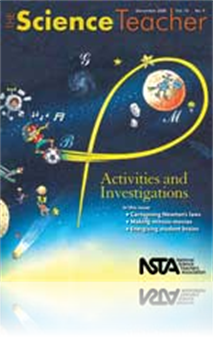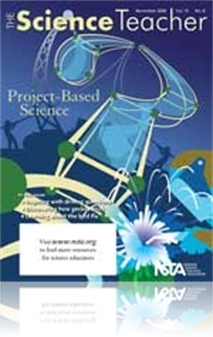All The Science Teacher resources
Journal Article
Safer Science: Safer Administrative Procedures
How often are your eyewash stations flushed? Do all of your school’s science labs have a direct line of communication with the front office and outside support officials? These and other questions are the focus of what the Occupational Health and S...
Journal Article
Editor’s Corner: Doing Science With PBS
Project-based science (PBS) is finding a place in more and more secondary school science programs as teachers discover its power to engage students and develop critical-thinking skills. PBS is firmly rooted in constructivism—the idea that individua...
Journal Article
“It was helpful to keep track of questions we had at the beginning so we knew what we were trying to find out.” With these words, a student described the value of using a Driving Question Board (DQB) in a project-based science (PBS) unit. This i...
Journal Article
Idea Bank: Performance-Based Assessment
Performance-based assessment is appropriate to use in a project-based, problem-based, or inquiry-based science classroom because it is consistent with the way students learn—by investigating a question or problem using tools and materials (i.e., pe...
Journal Article
A student recently asked me about the bird flu. Is it still a threat?...
Journal Article
Invasive species, commonly known as “invasives,” are nonnative plants, animals, and microbes that completely take over and change an established ecosystem. The consequences of invasives’ spread are significant. In fact, many of the species that...
Journal Article
Idea Bank: Science in Politics
All teachers face the classic struggle of convincing students that material learned in class is important and relevant. However, science teachers are fortunate because much of the material they teach comes up in everyday life. For example, the scienc...
Journal Article
In this article, the authors describe their ongoing experience with the Herpetology Project. Through this field study, students catch and track amphibians and reptiles in the Assabet River area, record and analyze data, share their findings with the ...
Journal Article
One way of implementing project-based science (PBS) is to use problem-based learning (PBL), in which students formulate their own problems. These problems are often ill-structured, mirroring complex real-life problems where data are often messy and i...
Journal Article
Understanding how geckos—small lizards belonging to the family Gekkonindae—can “defy gravity” and walk across a ceiling provides a fascinating frame through which students can not only learn valuable content about electrostatic forces, but al...
Journal Article
Career of the Month: An Interview With Aeronautical Engineer Paul Moller
Engineers are inventors, designers, and creators—they apply science, math, and imagination to make dreams a reality. As they work to craft technical solutions to consumer and societal needs, engineers bridge the gap between scientific ideas and com...



